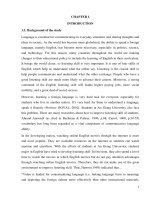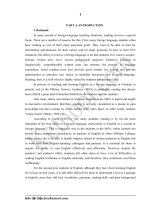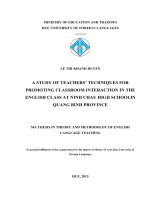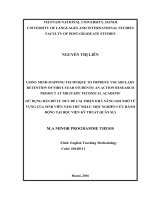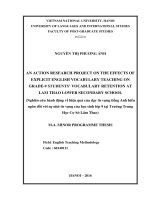The effects of using mock conferences to teach interpretation skills to the 4th year cadets of the English department at military science academy
Bạn đang xem bản rút gọn của tài liệu. Xem và tải ngay bản đầy đủ của tài liệu tại đây (505.76 KB, 12 trang )
v LANGUAGE TEACHING METHODOLOGY
THE EFFECTS OF USING MOCK CONFERENCES
TO TEACH INTERPRETATION SKILLS TO THE 4TH
YEAR CADETS OF THE ENGLISH DEPARTMENT
AT MILITARY SCIENCE ACADEMY
TRAN LE DUYEN*, LE THI CHUYEN**
*
Military Science Academy,
**
Military Science Academy,
Received: 13/3/2019; Revised: 09/4/2019; Accepted: 28/4/2019
ABSTRACT
Mock conference has been documented as an effective way to prepare interpreters for future
professional careers in many institutions. In Vietnam; however, its effectiveness remains
inconclusive as research on this activity has been rarely reported. Hence, this study presents
the findings of effects of applying this activity to teaching interpretation skills to the fourthyear cadets of the English Department at Military Science Academy. An action research was
conducted in one intact group at Military Science Academy via deploying three main instruments.
Similarly, the effect of using the model was measured by statistical data. Thus, the effect of the
mock conference on the cadets’ performance could be triple-checked. The findings revealed that
the new activity did improve cadets’ interpretation skills as it brought about seven key benefits.
Hence, it can be concluded that this activity may be a feasible solution to improving the quality
of teaching interpretation skills to the fourth year cadets at Military Science Academy so that they
can lay a good foundation for their future career as interpreters.
Keywords: mock conference, activity, effects, interpretation skills, apply
1. INTRODUCTION
Recent years have witnessed a shift from the
trainer-centred to trainee-centred approach to
training interpreters as the new approach seems to
be process-oriented, contextualized, interactive,
and effective (Kiraly, 2000). One of the most
prevailing activities in trainee-centred approach
to training interpreters is using mock conferences
14
KHOA HỌC NGOẠI NGỮ QUÂN SỰ
No. 19 (5/2019)
since it is of highly professional and contextualized
practice (Roy, 2000; Setton, 2006; Fernández
and Sempere, 2010). However, the effectiveness
of applying mock conferences to teaching
interpretation at Military Science Academy has
still been inconclusive. For these reasons, there
is a pressing need to examine the effectiveness
of mock conferences in the context of Military
Science Academy.
LANGUAGE TEACHING METHODOLOGY
2. LITERATURE REVIEW
A number of studies related to the implementation
of the mock conference in training interpreters
have been conducted in different parts of the world.
Some studies show positive results. For instance,
Setton and Dawrant (2016) reveal that conference
models provide trainees with opportunities to
practise in the most realistic situations. Davis, Liao
and Lin (2003) also release that mock conferences
enhance learners’ sensitivity to communicative
contexts. Likewise, Herrington and Oliver (2000)
and Hung and Chen (2002) unveil that mock
conferences act as a situated learning activity which
provides authentic contexts and enhances learnerteacher interactions as well as prepares learners
with real-life working environment. Moreover,
thanks to the simulated conference, learners are
able to be exposed to real-life situations (Jones,
1984). In addition, as Foster (2008) and Hyland
(1993) put it, this activity motivates learners and
scaffolds them from the classroom to the real
world. Besides, Ardito (1999) unseals that in
interpretation training, mock conference mirrors
necessary aspects of pragmatics, inter-linguistic
communication and speech acts. Last but not least,
according to Lim (2003), this simulated conference
provides trainees with real-world situations under
controlled circumstances. Finally, this activity
facilitates learners to acquire interpreting skills
better (Lee 2005). In a nutshell, mock conference
has been applied in many institutions and its
effectiveness has also been tested. However,
most of the aforementioned studies were carried
out in other learning environments. It would;
thus, be worthwhile to examine the effectiveness
of the activity in the context of Military Science
Academy. By doing so, can a clearer, broader
and more comprehensive picture about the
effectiveness of using mock conferences to teach
interpretation skills to the fourth-year cadets at
Military Science Academy be portrayed.
v
3. RESEARCH QUESTION
This study aims to investigate the research
question:
Are there any effects of mock conferences after
they have been adopted to teach interpretation
skills to the fourth-year cadets of the English
Department at Military Science Academy?
4. THE RESEARCH METHOD
4.1. The procedures of data collection
The procedures of data collection were mapped
out before the beginning of the first semester of
the school year 2017-2018. Having fulfilled the
procedure, the researcher directly taught the class
by applying mock conferences throughout the 18
lessons for nearly three months. Next, a survey
questionnaire was administered to the group.
Finally, an introspective with 3 most developed,
3 average developed and 3 least developed cadets
was carried out, transcribed and analyzed.
4.2. The background information about the
two groups
In the school year of 2017-2018, there was only
one military class of the English department at
Military Science Academy studying interpretation.
Therefore, the intact group was chosen for the
study. The total number of cadets in this class is 22.
They all have the same starting points as they have
fulfilled seven academic terms, including seven
different modules of translation. Thus, they can
be assumed to have a certain threshold proficiency
in translation. The last term covers interpretation
modules and internship.
4.3. Instruments
The three main instruments were used to obtain
the data for the study as follows:
KHOA HỌC NGOẠI NGỮ QUÂN SỰ
No. 19 (5/2019)
15
v LANGUAGE TEACHING METHODOLOGY
Instrument one: A survey questionnaire was
designed on the basis of Likert’s five scales to
find out the effect of using mock conferences on
cadets’ interpreting performance.
Instrument two: Videos of the mock
conference were used as one instrument to find out
internal evidence of the research.
Instrument three: An introspective interview
was conducted to triple-check the effects of the
mock conference on the cadets’ interpreting
performance.
items. These figures decode that mock conferences
are of a positive learning experience. This also
suggests that mock conferences can be perceived
as an effective learning activity as presented in the
following table 1.
The result of the survey questionnaire on the
effects of adopting mock conferences to teach
interpretation skills can be uncovered in the
following charts 1.
Chart 1. The effects of mock conferences of items
1-6 (N=22)
5. FINDINGS
5.1. Findings from the survey questionnaire
The cadets’ ratings of mock conferences are
presented in Table 1. As can be clearly seen in the
table, the percentages of cadets envisaging mock
conferences as a new, captivating, worthwhile,
useful and exciting learning experience are high.
More statistically, the proportions of the choice
“totally agree” in the items 1, 2, 3, 4, and 5 made
by the cadets are 66.4, 39.8, 54.3, 75 and 65.6,
respectively. Moreover, 0% is the figure of all the
options of “disagree” and “totally disagree” in all
As indicated in the first chart, the number of
the cadets choosing the answer “totally agree”
Table 1. Cadets’ ratings of mock conferences as a learning experience
Questionnaire Items
Totally agree
Agree
Quite agree
Totally disagree
Disagree
1. The mock conferences I have taken part in in my
interpreting lessons are new learning experiences.
66.4%
24.4%
9.2%
0%
0%
2. The mock conferences I have taken part in in my
interpreting lessons are captivating learning experiences.
39.8%
36.3%
23.9%
0%
0%
3. The mock conferences I have taken part in in my
interpreting lessons are worthwhile learning experiences.
54.3%
26.1%
19.5%
0%
0%
4. The mock conferences I have taken part in in my
interpreting lessons are useful learning experiences.
75%
16%
9%
0%
0%
5. The mock conferences I have taken part in in my
interpreting lessons are exciting learning experiences.
65.6%
28.3%
6.1%
0%
0%
16
KHOA HỌC NGOẠI NGỮ QUÂN SỰ
No. 19 (5/2019)
LANGUAGE TEACHING METHODOLOGY
for the six questions concerning their motivations
in applying mock conference in learning
interpretation ranged from less than a half to 20 in
the total of 22 cadets surveyed. Similarly, the data
of the cadets ticking “agree” and “quite agree”
options filled the rest of all the gaps. Therefore,
there was no room for the options “disagree’ or
“totally disagree”. These figures illustrate that the
cadets felt less stressful, more motivated and more
absorbed in this activity. In other words, thanks to
mock conferences, the cadets could build up their
confidence in acquiring interpretation skills. From
these statistics, it can be concluded that mock
conferences seemed to have positive effects upon
the cadets’ learning motivations.
As for the cadets’ acquiring interpretation
skills, the findings from the survey questionnaires
also unveil that mock conferences appeared to
have brought about a plethora of merits. The first
plus is the interpretation rotation for each cadets,
which is proved by the fact that the percentages of
cadets’ choice of “totally agree” and “agree” for
the question related to the frequency of rotating
their interpreting turns in the booth were 44.9 and
40.5, respectively. This can be confirmed by the
findings from question 11 in which 96.3% cadets
stated their preference for “totally agree” in the
option “mock conferences provides opportunities
for me to practise different real-life situations”.
Moreover, being asked if they could have their
creativeness promoted when fulfilling the assigned
tasks of mock conferences, 77.6% informants
favored the choice “totally agree”. Question 9
asked the participants whether the conference
model enriched their background knowledge
in terms of both linguistics and interpretation
skills. 0% was the proportion of the selection of
all the three scales: “quite agree”, “disagree” and
“totally disagree”. In contrast, 88.8% preferred the
answer “totally agree”. In addition, having their
interpretation environment familiarized is another
pivotal benefit of utilizing the mock conference.
Indeed, 100% informants nodded their head with
v
the options “totally agree”, “agree” and “quite
agree”, leaving no room for the two other scales
“disagree” and “totally disagree” in question
10. Besides, question 12 also uncaps one more
benefit of applying mock conferences in teaching
interpretation: enabling the cadets to manage their
time in a scientific and rational way. In short, mock
conferences seemed to be beneficial to those who
had applied them to acquiring interpretation skills
as seen in chart 2.
Chart 2. The effects of mock conferences of items
7-12 (N=22)
The third chart also depicts the positive
effects of mock conferences upon the cadets’
interpreting performance. At the first glance,
it can be clearly envisioned that the choices
of “totally agree” and “agree” accounted for a
weighty net in the overall picture of the four listed
questions; whereas, the choice of the rest two
scales was made by no informant. Statistically,
20 out of 22 respondents picked out the choice
“totally agree” and “agree” in the item stating that
they performed better interpreting attainments
thanks to mock conferences. Furthermore, the
figures for the cadets’ selection of “totally agree”
for the benefits of conference model in terms
of harnessing collective wisdom, enhancing
interactions and bringing all the existing facilities
into full play in items 14, 15 and 16 are 2, 13 and
18, correspondingly. Therefore, the results of all
the aforementioned questions skewed towards the
vertical axis as follows.
KHOA HỌC NGOẠI NGỮ QUÂN SỰ
No. 19 (5/2019)
17
v LANGUAGE TEACHING METHODOLOGY
Chart 3. The effects of mock conferences of items
13-16 (N=22)
Chart 5. The cadets’ total scores of skills and
tactics acquired from mock conferences (N=22)
Chart 4. The effects of mock conferences of items
13-16 (N=22)
The promising outcomes of the application of
mock conferences are also unsealed by the figures
in chart 4. Obviously, the four last questions
were posed with a view to rejecting the doubt as
to whether the model has long-term effects on
the cadets’ career orientation. The results of the
questionnaire reveal that the doubt can be rejected.
More specifically, only one cadet picked out the
option “disagree” in item 18; whereas, other items
17, 19 and 20 witnessed a high ratio of agreements
among the informants when 16, 21 and 22
participants ticked “totally agree”. In other words,
mock conferences result in a significant difference
in the cadets’ orientation for their future job as it is
a context-bound activity. (Chart 5)
18
KHOA HỌC NGOẠI NGỮ QUÂN SỰ
No. 19 (5/2019)
Together
with
the
aforementioned
questionnaires, 19 other questions were designed
with a view to getting an insight into their
acquisition of interpreting tactics and skills
necessary for their future job as what they have
been instructed in their textbook. Apparently,
nearly all the part and parcel requirements, tactics
and skills for interpreters have been trained via
mock conferences. As envisioned in chart 5,
the cadets’ total scores for the items concerning
the opportunities to train their concentration,
comprehension tactics, self-reflecting performance,
on-site problem solving skills, note-taking skills
short-term memory, preparing real-life-oriented
conferences, preventive tactics and public speaking
skills were all above 100 out of 120. Moreover,
mock conferences also enable them to be exposed
to many other interpreting tactics and skills such
as complying with professional ethics, bridging
gaps between two cultures, reconstruction tactics,
summarizing skills, anticipating skills, sharing
attention between listening ahead and notetakings, monitoring production, simplifying skills,
LANGUAGE TEACHING METHODOLOGY
reformulating skills and visualizing skills when
the total scores of these items are 59 minimally
and 99 maximally as follows.
In a nutshell, from the aforementioned statistical
findings of the study, it is possible to conclude that
mock conferences could have positive effects on
cadets’ interpretation performance and acquisition
of interpretation skills.
5.2. Findings from the cadets’ videos and
introspective interview
The research question “Are there any effects of
mock conferences after they have been adopted
to teach interpretation skills to the fourth-year
cadets of the English Department at Military
Science Academy? was fully answered when the
two other angles of the study: the cadets’ videos
and the introspective interview were portrayed.
The use of mock conferences uncapped the
following benefits.
To begin with, mock conferences were likely
to enhance the cadets’ awareness of autonomy
and cooperative work for better interpretation
performance as they themselves had to fulfill all
the tasks. In order to accomplish their assigned
tasks, each group had to explore information
related to the topic they had chosen from different
sources. Also, they had to cooperate with each
other to fulfill their job in a smooth way.
In addition, mock conferences appeared to
orientate the cadets to study in a systematic and
comprehensive way. Indeed, they had to make all
the necessary preparations for their conferences
such as nominating or electing the leader and
other roles for each conference; mapping out the
content outline, the scripts, the procedures and
backgrounds for their conferences. Moreover, they
had to rehearse their tasks until all the members had
mastered their roles. Finally, they had to present
their conference in the cabin with some unexpected
interference from other groups and lecturers.
v
Moreover, this activity seemed to create
opportunities for the cadets to learn from their
own weaknesses and strengths in a frank and free
manner. Furthermore, the new activity was likely
to pave the way for the cadets to learn from their
partner’s weaknesses and strengths. Indeed, when
fulfilling their mission, they learned from each
other and internalized what they had acquired in
class and delivered their speeches, discussions
and negotiations. The role of the teacher, hence,
was to guide this “cadet-led” learning by ensuring
information quality and to give them the tools to
teach each other.
Another benefit of mock conferences revealed
by the interview and videos is that this activity
taught the cadets about the real-life world. They
had to solve problems facing their community,
country, region and the world. Likewise, they
needed to integrate a wide range of skills and used
them in simulated tasks to check their readiness to
begin their career as interpreters. In other words,
the use of mock conference with scaffolding
from peers and lecturers may have served as a
lever to arm them with real-life scenarios. It also
served as a bridge joining classroom realism and
professional realism, paved the way for them to
embark into their career of interpretation. Hence,
they had remarkable career orientations involved
in professional experiences.
Besides, it is possible that mock conferences
could bring about cadets’ positive attitudes and
motivations towards their interpretation skills.
Mock conferences activated their imagination and
creativity which the cadets were naturally inclined
to do. Hence, they enjoyed exploring new places,
sharing common experiences with teammates and
friends. They also strove to conquer the highest
rate of their academic attainments as this activity
accounted for 25% of their total scores of their
interpretation subject.
Furthermore, mock conferences built their
leadership skills. As the cadets had to take turns
KHOA HỌC NGOẠI NGỮ QUÂN SỰ
No. 19 (5/2019)
19
v LANGUAGE TEACHING METHODOLOGY
to deliver interpretation and to chair their meeting
as well as to guide their group towards their goals,
they themselves developed leadership skills via
teamwork and negotiations.
Last but not least, these lessons might have
enhanced mutual interactions between the lecturer
and the cadets and the cadets themselves. Most
importantly, thanks to cadets’ reflections on the
lecturer’s tasks, she/he could find out the strengths
and weaknesses to adapt methodology for better
lessons.
It would also be interesting to find out that
there was a close correlation between the times the
cadets’ participation in delivering interpretation
during their mock conferences and their academic
attainments of the interpretation subject. It
seemed that the more frequently they took turn in
interpreting delivery, the more flying colours they
got. In fact, each cadet had to join at least three
different mock conferences for their interpretation
subject. However, the group members and the
roles of each member changed from time to time.
Of all the conferences, one was performed by two
11-member groups to take place of the mid-term
test. The cadets; therefore, had one week to make
all necessary preparations for what they were going
to do; and their turn in delivering interpretation in
the booth was of parity. As for the rest cadets, the
number of members in each group varied as the
lecturer assigned them on-the-spot. They had no
preparations in advance. Hence, each member’s
turn in delivering in interpretation in the booth
was not of equality. The following table illustrates
the positive correlation between the figures of
each group member whose turn in delivering
interpretation ranged from three to eight and the
mean scores of all the mock conferences they held
and participated in.
However, applying mock conferences to their
interpreting lessons seemed to be a challenging
task to the cadets for many reasons. First, they are
fledgling trainees with limited prior contextualized
20
KHOA HỌC NGOẠI NGỮ QUÂN SỰ
No. 19 (5/2019)
Table 2. The correlation between the times of the
cadets’ participation in delivering interpretation
during their mock conferences and the mean
scores of mock conferences
Cadets
Cadets’ turns in
delivering interpretation
during mock conferences
Cadets’ mean
scores of mock
conferences.
C1
5
7.63
C2
4
6.38
C3
4
6.55
C4
3
4.95
C5
4
6.68
C6
3
5.48
C7
4
6.98
C8
5
7.15
C9
8
9.07
C10
6
7.80
C11
6
7.68
C12
5
6.80
C13
7
8.98
C14
7
7.50
C15
5
6.98
C16
7
8.50
C17
6
7.33
C18
7
8.55
C19
7
7.93
C20
4
6.55
C21
3
5.55
C22
4
6.85
practices. Moreover, interpretation itself is a
burdensome subject meanwhile the cadets had
never had any chance to deliver interpretation
in reality. Another obstacle lies in time strain in
completing their task before deadline. The final
worry is their limited background knowledge of
the topic needed for the interpretation tasks.
In general, from this study, it might be
concluded that mock conferences could be
LANGUAGE TEACHING METHODOLOGY
beneficial to the cadets within a tight schedule at the
English Department of Military Science Academy.
6. DISCUSSIONS OF THE FINDINGS
After the aforementioned findings have been
presented, it is interesting to unveil that there exists
some coincidence with many other researchers as
follows.
First, as the cadets had been promised to
get some marks as a bonus at the end of the
semester, the cadets seemed to enjoy their mock
conferences. It is likely that when they took part
in mock conferences, they tended to assume more
responsibility for their learning and their set goals
as mock conferences could allow them to think
critically and become more pro-active, independent
and self-regulated learners. The findings are
supported by such researchers as García-Carbonell
and Watts (2010), Fernández and Sempere (2010)
and Foster (2008). Moreover, there seemed to
be some positive changes in the area of personal
achievement orientation and reflect on learning
as a process. This is backed by Lee (2011). Apart
from that, mock conferences were likely to be
found to be dual-valued in which they could offer
the opportunity for both the teacher and the cadets
to enhance their mutual interactions as found in
Lin, Davis and Liao (2004). More importantly,
mock conferences seemed to be ideal tools for
the teacher to encourage learners’ autonomy (Lin,
Davis and Liao, 2004).
In conclusion, the mock conference could
be advantageous to the cadets in the study. The
effectiveness could be explained by the design
of mock conferences, the context of learning and
teaching as well as the purpose of the course.
v
elaborate the benefits of using this activity in
teaching interpretation skills to the fourth-year
cadets of the English Department at Military
Science Academy. An action research was
conducted on 22 fourth-year cadets at Military
Science Academy. Furthermore, an introspective
interview was also conducted over 9 cadets (3
most developed, 3 average developed and 3 leastdeveloped cadets) after the interpretation course.
Cadets’ interpretation videos were also used to
illustrate the results of the findings. Statistical
data was calculated to find out the true effects of
adopting mock conferences to interpretation skills.
The study revealed 7 benefits of applying the
mock conference to teaching interpretation skills
to those cadets; namely, serving as a vehicle for
enhancing cadet’s awareness of autonomy and
cooperative work both inside and beyond the
classroom; developing problem-solving skills;
orientating cadets to study in a systematic and
comprehensive way in which they could entry
into their future profession; acting as a bridge
where both the teacher and the cadets have
opportunity of mutual interactions; raising the
cadets’ learning motivation and positive attitudes
towards interpretation skills, reflecting the public
speaking and inter-linguistic communication
skills and bridging between classroom realism
and professional realism. However, there should
be further studies on this issue so that the
generalization of these findings can be made for
better outcomes.
References:
Ardito, G. (1999). The Systematic Use of Impromptu Speech in
Training Interpreting cadets. The Interpreters’ Newsletter
9, 177-189.
7. CONCLUSION
Davis, C., Liao, P., and Lin, J. (2003). An Innovative Teaching
Activity for Undergraduate Interpretation Courses: the
Use of Mock Conference as a Term Project. National
Chiao Tung University.
In this study, some major issues concerning the
use of mock conferences to teach interpretation
skills have been taken into account in order to
Fernández, C. P., and Sempere, F. L. (2010). Shifting from
Translation Competence to Translator Competence. In
Teaching and Testing Interpreting and Translating, edited
by V. Pellatt, K. Griffiths, and S. Wu, 131-147. Bern: Peter Lang.
KHOA HỌC NGOẠI NGỮ QUÂN SỰ
No. 19 (5/2019)
21
v LANGUAGE TEACHING METHODOLOGY
Foster, A. N. (2008). Games and Motivation to Learn Science.
Journal of Interactive Learning Research 19 (4), 597-614.
Kiraly, D. (2000). A Social Constructivist Approach to
Translator Education. Manchester: St. Jerome.
García-Carbonell, A., and Watts. F. (2010). The Effectiveness of
Telematic Simulation in Languages for Specific Purposes. In
Linguistic and Didactic Aspects of Language in Business
Communication, edited by T. Bungarten, 1-16. Hamburg:
Universität Hamburg.
Lee, M. (2005). Benefits of Creating Actual Conference Setting
in Interpretation Pedagogy. Conference Interpretation and
Translation 7 (1): 99-124.
González, M. D. (2012). Towards Situated Translation Training:
Bridging Academic and Professional Approaches. Training
Postgraduate cadets for the Translation Profession.
Translation Studies Symposium, University of Auckland.
Herrington, J., and R. Oliver. (2000). An Instructional
Design Framework for Authentic Learning Environments.
Educational Technology Research and Development 48
(3): 23-48.
Lee, Y. H. (2011). Comparing Self-assessment and Teacher’s
Assessment in Interpreter Training. T&I Review 1: 87-111.
Lim, H. O. (2003). Applying Educational Models to Teaching
Interpretation. Conference Interpretation and Translation
5 (2): 149-167.
Lin, J., Davis, C. and Liao. P. (2004). The Effectiveness of Using
International Mock Conference in Interpreting Courses.
Studies of Translation and Interpretation 9: 81-107.
Hung, D., and Chen, D. (2002). Two Kinds of Scaffolding.
Education Technology & Society 5 (4): 148-153.
Roy, C. B. (2000). Interpreting as a Discourse Process. Oxford:
Oxford University Press.
Hyland, K. (1993). Language-learning Simulations. English
Teaching Forum 31 (4): 16-26.
Setton, R. (2006). Context in Simultaneous Interpretation.
Journal of Pragmatics 38 (3): 374-389.
Jones, K. (1984). Simulations in Language Teaching.
Cambridge: Cambridge University Press.
Setton, R., and Dawrant, A. (2016). Conference Interpreting A Complete Course. Benjamins Translation Library.
HIỆU QUẢ CỦA VIỆC ÁP DỤNG HỘI THẢO MẪU VÀO GIẢNG DẠY DỊCH NÓI
CHO HỌC VIÊN NĂM THỨ 4 KHOA TIẾNG ANH – HỌC VIỆN KHOA HỌC QUÂN SỰ
TRẦN LÊ DUYẾN, LÊ THỊ CHUYÊN
Tóm tắt: Hiện nay, nhiều cơ sở đào tạo dịch thuật trên thế giới đã và đang sử dụng hội thảo mẫu để
đào tạo phiên dịch viên. Tuy nhiên, hiệu quả thực sự của hoạt động này vẫn chưa được kiểm chứng
đầy đủ ở Học viện Khoa học Quân sự. Vì lẽ đó, nghiên cứu này được tiến hành ở một lớp năm thứ tư
tại Học viện Khoa học Quân sự, thông qua ba công cụ nghiên cứu nhằm kiểm chứng hiệu quả của hội
thảo mẫu trong dạy môn dịch nói. Kết quả nghiên cứu được phân tích dựa trên cơ sở dữ liệu thống
kê từ câu hỏi điều tra, phỏng vấn hồi tưởng và băng video quay được từ hội thảo mẫu nhằm khẳng
định hiệu quả thực sự của phương pháp này. Kết quả nghiên cứu cho thấy, hội thảo mẫu mang lại bảy
lợi ích trong dạy và học môn dịch nói cho học viên năm thứ tư Khoa tiếng Anh - Học viện Khoa học
Quân sự, góp phần chuẩn bị hành trang cho nghề phiên dịch trong tương lai.
Từ khóa: hội thảo mẫu, biện pháp, hiệu quả, kỹ năng phiên dịch, áp dụng
Ngày nhận bài: 13/3/2019; ngày sửa chữa: 09/4/2019; ngày duyệt đăng: 28/4/2019
22
KHOA HỌC NGOẠI NGỮ QUÂN SỰ
No. 19 (5/2019)
LANGUAGE TEACHING METHODOLOGY
v
APPENDICES
1. Survey questionnaire
SURVEY QUESTIONNAIRE
This survey questionnaire is designed to investigate the effects of using mock conferences to teach interpretation skills to the
4th year cadets of the English Department at Military Science Academy. You are eligible for the study as you have already finished
your interpretation subject. Your support in fulfilling the survey will be highly appreciated. You can be confident that you will not be
identified in any discussion of the data.
Thank you very much for your cooperation.
I. Personal information: Please cross (x) in the box that is true for you
1. Your gender:
Male
Female
2. You have been learning English for
10 years
more than 10 years
II. The followings are the statements concerning the effects of the mock conferences you have applied in your
interpretation lessons. I would like you to indicate your opinion of each statement by choosing the option that is
true for you. Your option should be indicated by a cross (x).
Numbers
Questionnaire Items
1
The mock conferences I have taken part in in my interpreting lessons are
useful learning experiences.
2
The mock conferences I have taken part in in my interpreting lessons are
captivating experiences.
3
The mock conferences I have taken part in in my interpreting lessons are
worthwhile experiences.
4
The mock conferences I have taken part in in my interpreting lessons are
beneficial experiences.
5
The mock conferences I have taken part in in my interpreting lessons are
motivating experiences.
6
The mock conferences I have taken part in in my interpreting lessons
create motivations for me to study my interpretation subject better.
7
The mock conferences I have taken part in in my interpreting lessons create
a good learning environment for me to study my interpretation subject.
8.
The mock conferences I have taken part in in my interpreting lessons
create inspirations for me to study my interpretation subject better.
9
The mock conferences I have taken part in in my interpreting lessons
facilitate my acquisition of the interpretation subject better.
10
The mock conferences I have taken part in in my interpreting lessons build
up confidence in my acquisition of the interpretation subject.
11
The mock conferences I have taken part in in my interpreting lessons ease
my pressures on my acquisition of the interpretation subject.
12
The mock conferences I have taken part in in my interpreting lessons
create more opportunities for me to take turns in delivering interpretation
in the booth.
Totally
agree
Agree
Quite
agree
Totally
disagree
KHOA HỌC NGOẠI NGỮ QUÂN SỰ
No. 19 (5/2019)
Disagree
23
v LANGUAGE TEACHING METHODOLOGY
13
The mock conferences I have taken part in in my interpreting lessons
capture my creativeness in my acquisition of the interpretation subject.
14
The mock conferences I have taken part in in my interpreting lessons arm
me with more background knowledge and interpretation skills.
15
The mock conferences I have taken part in in my interpreting lessons
familiarize me with real-life interpreting situations.
16
The mock conferences I have taken part in in my interpreting lessons
provide me with more opportunities to be exposed to situated contexts
of interpreters.
17
The mock conferences I have taken part in in my interpreting lessons
enable me to manage my time more scientifically and rationally.
18
The mock conferences I have taken part in in my interpreting lessons lay
a good foundation for me to earn higher academic attainments in the
interpretation subject.
19
The mock conferences I have taken part in in my interpreting lessons
harness my collective wisdom in acquiring the interpretation subject.
20
The mock conferences I have taken part in in my interpreting lessons
create more opportunities for me to interact with my group members in my
acquisition of the interpretation subject.
21
The mock conferences I have taken part in in my interpreting lessons create
more opportunities for me to bring all the existing facilities and resources
into full play in my acquisition of the interpretation subject.
22
The mock conferences I have taken part in in my interpreting lessons
maximize my pro-activeness in training interpretation skills.
23
The mock conferences I have taken part in in my interpreting lessons make
full use of my free time in acquiring the interpretation subject.
24
The mock conferences I have taken part in in my interpreting lessons
create more room for me to train interpretation skills.
25
The mock conferences I have taken part in in my interpreting lessons equip
me with a good job-orientation for my future career as an interpreter.
26
The mock conferences I have taken part in in my interpreting lessons
create opportunities for me to train my visualizing skills.
27
The mock conferences I have taken part in in my interpreting lessons
create opportunities for me to train reformulating skills.
28
The mock conferences I have taken part in in my interpreting lessons
create opportunities for me to train simplifying skills.
29
The mock conferences I have taken part in in my interpreting lessons
create opportunities for me to monitor production.
30
The mock conferences I have taken part in in my interpreting lessons
create opportunities for me to share attention between listening ahead
and note-taking.
31
The mock conferences I have taken part in in my interpreting lessons
create opportunities for me to train anticipating skills.
32
The mock conferences I have taken part in in my interpreting lessons
create opportunities for me to train summarizing skills.
33
The mock conferences I have taken part in in my interpreting lessons
create opportunities for me to train reconstruction tactics.
34
The mock conferences I have taken part in in my interpreting lessons
create opportunities for me to bridge the gaps between two cultures.
35
The mock conferences I have taken part in in my interpreting lessons
create opportunities for me to comply with professional ethics.
36
The mock conferences I have taken part in in my interpreting lessons
create opportunities for me to train comprehension tactics.
37
The mock conferences I have taken part in in my interpreting lessons
create opportunities for me to train my self-reflecting performance..
24
KHOA HỌC NGOẠI NGỮ QUÂN SỰ
No. 19 (5/2019)
LANGUAGE TEACHING METHODOLOGY v
38
The mock conferences I have taken part in in my interpreting lessons
create opportunities for me to train on-site problem solving skills.
39
The mock conferences I have taken part in in my interpreting lessons
create opportunities for me to train note-taking skills..
40
The mock conferences I have taken part in in my interpreting lessons
create opportunities for me to train short-term memory.
41
The mock conferences I have taken part in in my interpreting lessons
create opportunities for me to prepare real-life-oriented conferences.
42
The mock conferences I have taken part in in my interpreting lessons
create opportunities for me to train preventive tactics.
43
The mock conferences I have taken part in in my interpreting lessons
create opportunities for me to train public speaking skills
44
The mock conferences I have taken part in in my interpreting lessons
create opportunities for me to train concentration
Thank you very much for your cooperation.
2. Introspective interview
THE INTROSPECTIVE INTERVIEW
Câu 1: Đồng chí có suy nghĩ gì về sự cần thiết của việc áp dụng hội thảo mẫu trong học môn dịch nói?
Câu 2: So với việc tuân thủ tất cả các nội dung liên quan đến các kỹ năng dịch trong giáo trình Dịch Nói, đồng chí có nhận
định gì về những ưu điểm, nhược điểm của việc bổ sung hội thảo mẫu trong việc học môn dịch nói?
Câu 3: Đồng chí có hứng thú với việc tham gia một buổi hội thảo mẫu không? Vì sao?
Câu 4: Đồng chí cảm nhận thế nào khi phải chuẩn bị tất cả các bước cần thiết cho hội thảo mẫu?
Câu 5: Đồng chí có cảm thấy hài lòng với kết quả đạt được sau từng buổi hội thảo mẫu không? Vì sao?
Câu 6: Đồng chí có áp dụng được phần lý thuyết được giảng viên cung cấp vào các hội thảo mẫu không? Nếu có thì đó là
những kỹ năng nào?
Câu 7: Đồng chí có nhận định gì về những lợi ích mà hội thảo mẫu mang lại trong quá trình học môn dịch nói?
Câu 8: Đồng chí có nhận định gì về những khó khăn mà đồng chí gặp phải khi tham gia thực hiện hội thảo mẫu trong quá trình
học môn dịch nói?
Câu 9: Nếu đồng chí được giao nhiệm vụ thực hiện hội thảo mẫu khi học môn dịch nói một lần nữa, đồng chí sẽ làm gì để đạt
được hiệu quả cao nhất?
Câu 10: Đồng chí có khuyến nghị gì đối với giảng viên, các nhà quản lý giáo dục cũng như các phòng, khoa, ban và hệ để
thực hiện tốt hoạt động hội thảo mẫu, góp phần nâng cao chất lượng học môn dịch nói tại Khoa tiếng Anh?
Xin trân trọng cảm ơn đồng chí đã trả lời cuộc phỏng vấn hồi tưởng này.
KHOA HỌC NGOẠI NGỮ QUÂN SỰ
No. 19 (5/2019)
25


